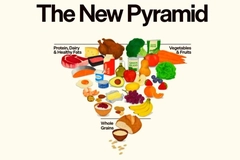“Talk is cheap”: Leaked MAHA report promotes whole foods with lax regulation

The leaked Make Our Children Healthy Again Strategy by the Make America Healthy Again (MAHA) Commission reveals how the Trump administration plans to tackle chronic diseases. However, it has faced criticism for not implementing stronger regulatory actions for better health, while its recent budget cuts to nutrition seemingly contradict nutrition progress.
The document mentions partnerships across government agencies to tighten the regulation of additives and processed foods. More focus is on nutrition and whole foods, better evidence standards for health claims, and more federal support for nutrition-as-medicine programs.
However, the Center for Science in the Public Interest’s science director, Aviva Musicus, underlines that the strategy focuses on voluntary action to reduce food additives, sodium, and added sugar in foods, instead of regulation.
“The report seems to twist itself into knots to make it clear that it will not be infringing upon food companies, such as its assertion that HHS and FTC ‘will explore development of potential industry guidelines to limit the direct marketing of certain unhealthy foods to children.’”
“Talk is cheap. We need to hold the administration accountable for living up to its promise to improve health. But we also need to judge the administration by what it does, not what it says,” states Musicus.
“And the administration’s attacks on SNAP, Medicaid, the health insurance exchanges, and the FDA and USDA [US Department of Agriculture] workforces are poised to make America sicker, hungrier, and more at risk from unsafe food.”
Musicus calls out the commission’s strategy to address alcohol, vaping, and opioid use through education and not regulation, without mentioning tobacco.
“It’s quite rich for an administration that is plunging the country into a nutrition security and food safety nightmare to now promise to make America healthy ‘again.’”
She also calls out the actions that threaten vaccine accessibility, risking preventable disease outbreaks.
“The administration’s so-called Big Beautiful Bill is pushing healthy food out of reach for millions of Americans and is ripping health care coverage from millions more.”
Research collaborations
The strategy outlines expanding nutrition research and innovation with collaborations between the National Institutes of Health (NIH), the FDA, the USDA, and the American Heart Association. They will carry out ingredient assessments and focus on precision nutrition.
 Musicus underlines that the strategy focuses on voluntary action to reduce food additives, sodium, and added sugar in foods, instead of regulation.The FDA and NIH will strengthen evidence-based ingredient safety and nutrition science. More research will be conducted into the gut microbiome and oral health links to chronic disease.
Musicus underlines that the strategy focuses on voluntary action to reduce food additives, sodium, and added sugar in foods, instead of regulation.The FDA and NIH will strengthen evidence-based ingredient safety and nutrition science. More research will be conducted into the gut microbiome and oral health links to chronic disease.
The report calls for food for health programs that will study and apply food and lifestyle interventions as medical tools through large-scale randomized controlled trials.
In April, the Trump administration announced the intention to lay off 20,000 health-care workers, which sparked outrage among public health experts, while scientists sued the NIH over research funding cuts.
“The administration, with the help of DOGE [Department of Government Efficiency], has totally upended biomedical research in America, delaying progress on fighting cancer, diabetes, Alzheimer’s, and other diseases,” warns Musicus.
Policy actions
The leaked report outlines some policy reforms, targeting dietary guidelines reform, food dyes, ultra-processed foods, nutrition labeling, GRAS reform, and infant formula and breastfeeding, among others.
It states that the dietary guidelines for 2025–2030 will be science-based, and healthy recommendations will reform future guideline processes, such as membership and scientific review.
The FDA will limit or ban petroleum-based food dyes in favor of natural, food-safe colors, and the USDA will apply this to school lunches.
Government agencies will also define ultra-processed foods for more uniform research and regulation.
 USDA will test providing SNAP recipients with “MAHA Boxes” of nutritious food.The FDA will also consider front-of-pack labeling with clearer “no artificial color” claims. The “Generally Recognized as Safe” framework will be updated for additives.
USDA will test providing SNAP recipients with “MAHA Boxes” of nutritious food.The FDA will also consider front-of-pack labeling with clearer “no artificial color” claims. The “Generally Recognized as Safe” framework will be updated for additives.
The report also outlines that stricter nutrient testing for infant formula will be combined with policies promoting breastfeeding and donor milk supply.
School and hospital meals
All 16 federal nutrition programs will see some changes, such as the USDA’s SNAP (food stamps), WIC (women, infants, and children), and school meals with whole, minimally processed foods.
The USDA will help states with SNAP waiver development and implementation while also piloting “MAHA Boxes” of healthy food to SNAP participants, outlines the report.
Additionally, school meals will get more funding for healthy foods, while the Administration for Children and Families and the USDA will improve access to the Child and Adult Care Food Program.
The MAHA Commission also plans to align school meals, Veterans Affairs meals, and specific hospital food programs with the dietary guidelines.
The leaked report follows the commission’s previous report on childhood chronic diseases, warning that more than one in five children over six years old in the US are obese. It faced backlash for regurgitating bias, failing to link to deeper issues linked to health, and citing fake references.


















